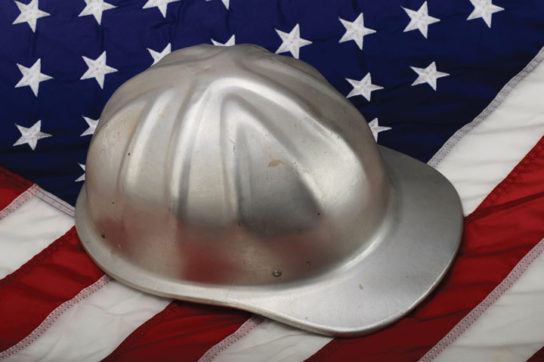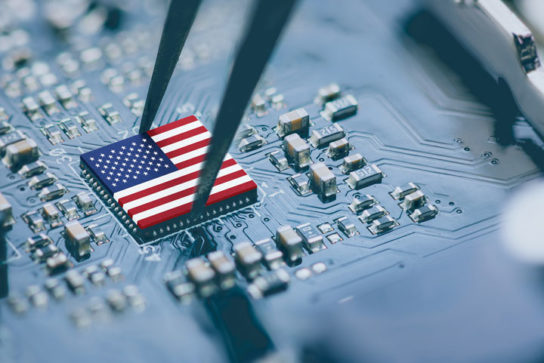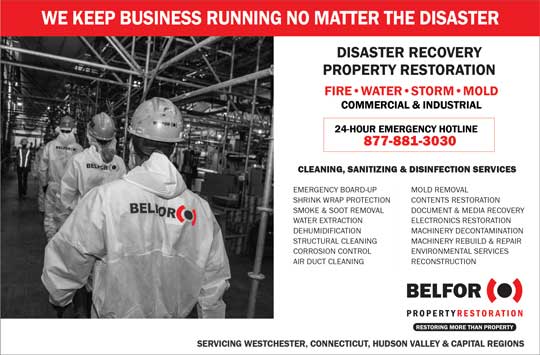FROM THE NATIONAL ASSOCIATION OF MANUFACTURERS
MANUFACTURERS UNVEIL COMPETITIVENESS AGENDA AHEAD OF MIDTERM ELECTIONS
Ahead of the midterm elections, the National Association of Manufacturers released its policy roadmap, “Competing to Win,” a comprehensive blueprint featuring immediate solutions for bolstering manufacturers’ competitiveness. It is also a roadmap for policymakers on the laws and regulations needed to strengthen the manufacturing industry in the months and years ahead.

With the country facing rising prices, snarled supply chains and geopolitical turmoil, manufacturers are outlining an actionable competitiveness agenda that Americans across the political spectrum can support. “Competing to Win” includes the policies manufacturers in America will need in place to continue driving the country forward.
“Competing to Win” offers a path for bringing our country together around policies, shared values and a unified purpose,” said NAM President and CEO Jay Timmons. “The NAM is putting forward a plan filled with ideas that policymakers could pursue immediately, including solutions to urgent problems, such as energy security, immigration reform, supply chain disruptions, the ongoing workforce shortage, and more. Manufacturers have shown incredible resilience through difficult times, employing more workers now than before the pandemic, but continued resilience is not guaranteed without the policies that are critical to the state of manufacturing in America.”
The NAM and its members will leverage “Competing to Win” to shape policy debates ahead of the midterm elections, in the remainder of the 117th Congress and at the start of the 118th Congress—including in direct engagement with lawmakers, for grassroots activity, across traditional and digital media and through events in key states and districts as we did following the initial rollout of the roadmap in 2016. The document focuses on 12 areas of action, and all policies are rooted in the values that have made America exceptional and keep manufacturing strong: free enterprise, competitiveness, individual liberty, and equal opportunity.
TAX: BUILDING ON THE PROMISE OF TAX REFORM
Manufacturers asked, and Congress delivered with the passage of tax reform. As a result, manufacturers have been paying forward the benefits. With a commitment to federal policies that build on those advances rather than roll them back, the industry will continue leading our workers, communities and country toward prosperity.
Values that have made America exceptional and keep manufacturing strong:
free enterprise, competitiveness, individual liberty, and equal opportunity.
TRADE: SUPPORTING MANUFACTURING JOBS AND GROWTH; REMOVING UNCERTAINTY AND UNFAIR BARRIERS
Manufacturers of all sizes compete in a global economy, selling to U.S. customers and to the billions of consumers around the world. Pursuing policies that improve manufacturers’ competitiveness and ability to reach new customers abroad will allow manufacturers in the United States to compete—and win—in the global market.
ENVIRONMENT AND SUSTAINABILITY: CREATING CLEANER, SAFER AND MORE INCLUSIVE ECONOMIES
Everyone wants clean water and clean air. Everyone wants a good job and a strong economy. With federal policies that balance these goals, manufacturers can continue leading the way the world addresses climate change and other environmental issues.
ENERGY AND NATURAL RESOURCES: STRENGTHENING MANUFACTURING BY CAPITALIZING ON U.S. ENERGY LEADERSHIP
Manufacturers utilize and benefit from all forms of energy, while making smart investments to become more energy efficient and protect the environment. The future of the manufacturing industry and our country’s resource security rely on clarity and certainty from policymakers that strengthens our competitiveness.
TRANSPORTATION AND INFRASTRUCTURE: CATCHING UP AND BUILDING FOR TOMORROW
The 2021 bipartisan infrastructure law represents historic investment. For too long, the structures that support the movement of free enterprise and families have been frail and failing. As we work to ensure the law is implemented successfully, we also have to ensure that we take all necessary actions to keep supply chains running. As national and international supply chain disruptions have made painfully clear, maintaining and modernizing our infrastructure is essential to keeping products moving and manufacturers operating.
WORKFORCE AND EDUCATION: EQUIPPING THE WORKFORCE FOR REWARDING CAREERS
One of the key competitiveness challenges facing manufacturers is access to a skilled workforce. Workforce policy should prioritize employer leadership and participation in postsecondary education and training programs. And it should enable more individuals to develop the skills needed to begin or advance in their career.
LABOR AND EMPLOYMENT: ADAPTING POLICIES FOR A 21ST-CENTURY WORKFORCE
It’s time to modernize labor and employment laws and regulations to fit the needs of today’s manufacturing workforce. The manufacturing shop floor has changed. Meanwhile, manufacturers in the United States face government-imposed challenges that are not faced equally by many of our global competitors.
IMMIGRATION: REFORMING THE IMMIGRATION SYSTEM FOR AMERICAN COMPETITIVENESS
America is a nation of immigrants—and a nation with a broken immigration system. If we continue with current immigration practices, we will lose talent, opportunity and economic growth. Manufacturers believe that now is the time to enact immigration reforms that balance compassion and security to create a stronger country and a stronger economy.
Manufacturers have created an innovation engine that has reshaped the world around us.

HEALTH CARE: KEEPING AMERICANS HEALTHY AND PRODUCTIVE; UNLEASHING INNOVATION
Manufacturers of all sizes cite rising health care expenses as one of their top business concerns, and they need certainty to negotiate affordable, best-in-class health plans. Policymakers should allow free enterprise principles to guide health care policy decisions to encourage and protect the health care cures and solutions of tomorrow.
CORPORATE GOVERNANCE: SUPPORTING CAPITAL FORMATION AND PROTECTING INVESTORS
Manufacturers depend on public markets to finance business growth, job creation and economic expansion, and workers rely on the success of publicly traded companies for their savings and retirement. As such, policymakers should rein in unregulated third parties, enable manufacturers to engage effectively with their shareholders and protect middle-class investors.
RESEARCH, INNOVATION AND TECHNOLOGY: POWERING MANUFACTURING 4.0
Manufacturers have created an innovation engine that has reshaped the world around us. As modern manufacturing in the U.S. races toward the new economic era and pursues technologies to lead new operational advances, federal policies must keep up with the industry’s needs, prioritizing both investment and innovation.
REGULATORY AND LEGAL REFORM: REDUCING BARRIERS TO ECONOMIC GROWTH
Smart regulation is critical to protecting worker safety, public health and our environment. Overregulation will hold back our country’s economic potential and undermine manufacturers’ competitiveness. Reforming the nation’s broken legal and regulatory systems, ensuring regulations achieve their intended goal without unnecessarily harming competitiveness, will help fully unleash our economic engine.



